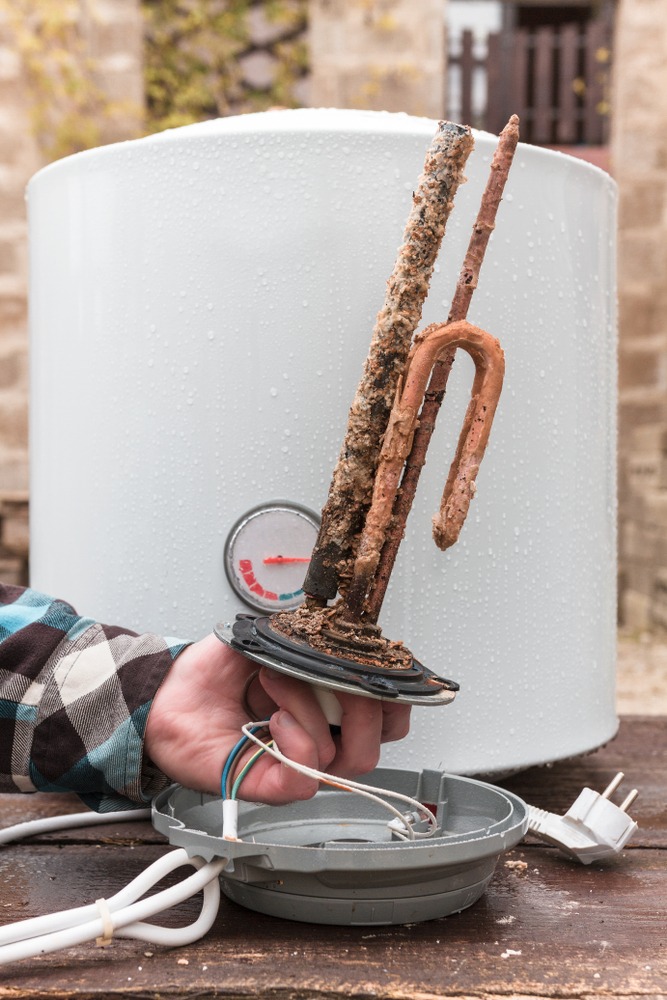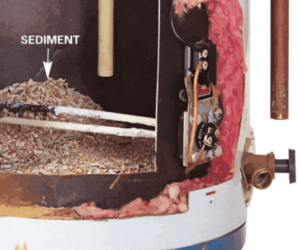You’re standing in your laundry room or bathroom, and suddenly, a strange popping sound echoes from your water heater. It’s unsettling, isn’t it?
That unexpected noise can be more than just a nuisance; it might be a sign that something is amiss with your trusty appliance. But before you hit the panic button or call for expensive repairs, take a deep breath. Understanding what causes this popping sound can save you time, money, and stress.
You’ll discover the simple reasons behind the noise and learn easy steps you can take to fix it. So, stick around and find out how you can keep your water heater running smoothly and silently.

Credit: brianwearplumbing.com
Page Contents
Causes Of Popping Sounds
Sediment can gather at the bottom of a water heater. It hardens over time. This causes a popping sound. Water heats up and moves the sediment. The noise can be surprising. Regular cleaning can help. Keep your heater quiet and efficient.
Water often contains minerals like calcium. These minerals can form hard layers inside the heater. This layer makes popping noises. It also reduces efficiency. Use a water softener to reduce buildup. It keeps the heater working better.
Water heaters can face temperature changes. These changes cause metal parts to expand. The expansion creates popping sounds. Adjusting the thermostat can help. Keep the temperature steady. This reduces the noise and wear on the heater.
Impact On Water Heater Performance
A popping sound in a water heater can mean reduced efficiency. This sound often comes from sediment buildup at the bottom. The heater works harder to heat water. It uses more energy than needed. Efficiency drops and water may not be as hot.
With reduced efficiency, energy bills can go up. The heater uses more power to heat water. Even small popping sounds can lead to big bills. Keeping a heater clean can help lower costs.
Popping sounds can also signal potential damage. Sediment buildup might cause parts to wear out. This could lead to leaks or even heater failure. Regular maintenance can help avoid costly repairs.
Prevention Strategies
Regular maintenance keeps your water heater working well. Cleaning helps remove sediment. Sediment causes popping sounds. Check the heater every six months. Look for leaks or rust. Fix issues quickly to avoid problems. A clean heater works quietly and safely.
Hard water is tough on heaters. It makes sediment build up faster. Use a water softener to reduce hardness. Soft water helps your heater run smoothly. It protects against popping sounds. Softening water extends the heater’s life. A simple solution for quiet operation.
High temperatures cause noise. Lower settings reduce popping sounds. Keep the water heater temperature around 120 degrees. This setting is safe and efficient. Adjust the thermostat if needed. Proper regulation prevents overheating and noise. Easy steps for a quiet heater.

Credit: www.plumbingbyjake.com
Troubleshooting Techniques
Flushing the tank can help stop the popping noise. Sediments build up over time. These sediments cause the popping sound. First, turn off the heater. Attach a hose to the drain valve. Open the valve to let water out. This helps remove the sediments. Clean tanks work better and last longer.
Check all parts of the heater. Look for signs of wear. Sometimes, loose parts make noises. Tighten screws and connections if needed. Check the heating element too. Replace broken parts to stop the noise.
Sometimes fixing it yourself is hard. Call an expert if the noise continues. Experts know how to fix heaters. They keep you safe and make sure the heater works. It’s best to get help if you are unsure.
When To Replace Your Water Heater
Look for rust on the tank. Rust means the heater is getting old. Leaks also show wear and tear. If you see water on the floor, check your heater. Listen for strange sounds. Popping sounds can mean trouble. These signs suggest replacement might be needed soon.
Water heaters usually last 10 to 15 years. Age matters a lot. Older heaters break more often. Once your heater is over 10 years, think about getting a new one. New heaters work better and use less energy. They save money in the long run.
Fixing an old heater can be expensive. New heaters cost money too. But new ones save energy. They lower your bill. Think about repair costs versus new heater costs. New heaters also have warranties. They offer peace of mind.

Credit: cassplumbingtampabay.com
Choosing The Right Water Heater
Experiencing a popping sound from your water heater often signals sediment buildup. This can affect efficiency and lifespan. Regular maintenance helps prevent issues, ensuring the heater runs smoothly and quietly.
Types Of Water Heaters
Water heaters come in different types. Tankless water heaters heat water on demand. Storage tank heaters store hot water in a large tank. Heat pump water heaters use electricity to move heat. Solar water heaters use the sun’s energy. Hybrid heaters combine technologies for better efficiency. Each type has its pros and cons.
Energy Efficiency Ratings
Energy efficiency ratings show how well a heater saves energy. Higher ratings mean lower energy bills. Look for the Energy Star label. It indicates the heater is efficient. Efficient heaters are good for the environment. They help reduce energy use. Saving energy is important for everyone.
Size And Capacity
Size and capacity matter. Small heaters are good for small homes. Big heaters serve large families. Capacity means how much hot water it can hold. Choose a size that fits your needs. Think about space in your home. Consider your hot water usage. Match the heater to your lifestyle.
Frequently Asked Questions
Is It Normal For My Water Heater To Make Popping Noises?
Popping noises from a water heater can be normal. Sediment buildup often causes these sounds. Regular maintenance and flushing help reduce noise and extend the heater’s lifespan. If noises persist, consult a professional to ensure everything functions correctly.
How Do I Stop My Water Heater From Knocking?
Flush the water heater tank to remove sediment buildup. Adjust the thermostat to prevent overheating. Install a water hammer arrestor if needed. Regular maintenance ensures smooth operation and reduces knocking sounds.
Should I Be Concerned About A Water Heater Making A Noise?
Yes, a noisy water heater can signal issues like sediment buildup, loose parts, or high pressure. Regular maintenance and inspections help identify problems early and prevent costly repairs. Consult a professional if unusual sounds persist to ensure safe and efficient operation.
What Are Signs That Your Hot Water Heater Is Going Out?
Rusty water, inconsistent temperatures, and strange noises indicate a failing water heater. Leaks or puddles around the unit suggest damage. Lack of hot water is a major sign. A water heater over 10 years old may need replacement. High energy bills can also indicate inefficiency.
Conclusion
Solving the water heater popping sound is easier than you think. Regular maintenance helps prevent these annoying noises. Flush the tank yearly to remove sediment. Check the temperature setting; it should not be too high. Listen for unusual sounds and address them quickly.
Calling a professional can save time and stress. Keep your water heater healthy and quiet. Enjoy peace of mind knowing your appliances are in good shape. A quiet water heater means a happy home. Stay vigilant, and you’ll avoid costly repairs.
Prevention is always better than cure.
